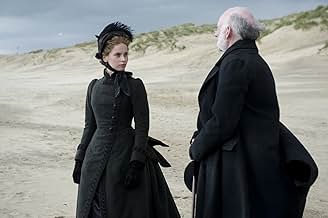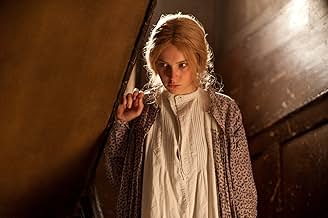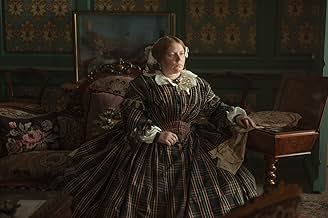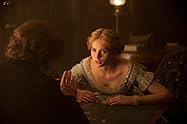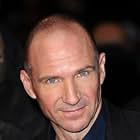At the height of his career, Charles Dickens meets a younger woman who becomes his secret lover until his death.At the height of his career, Charles Dickens meets a younger woman who becomes his secret lover until his death.At the height of his career, Charles Dickens meets a younger woman who becomes his secret lover until his death.
- Nominated for 1 Oscar
- 1 win & 7 nominations total
Ralph Fiennes
- Charles Dickens
- (as Mr. Ralph Fiennes)
Felicity Jones
- Nelly
- (as Ms. Felicity Jones)
Kristin Scott Thomas
- Mrs. Frances Ternan
- (as Ms. Kirstin Scott Thomas)
Tom Hollander
- Wilkie Collins
- (as Mr. Tom Hollander)
John Kavanagh
- Rev. William Benham
- (as Mr. John Kavanagh)
Tom Attwood
- Mr. Lambourne
- (as Mr. Tom Atwood)
Susanna Hislop
- Mary
- (as Ms. Susanna Hislop)
Tom Burke
- Mr. George Wharton Robinson
- (as Mr. Tom Burke)
Tommy Curson-Smith
- Geoffrey
- (as Mr. Tommy Curson-Smith)
David Collings
- Governor
- (as Mr. David Collings)
Michael Marcus
- Charley Dickens
- (as Mr. Michael Marcus)
Perdita Weeks
- Maria Ternan
- (as Ms. Perdita Weeks)
Richard McCabe
- Mr. Mark Lemon
- (as Mr. Richard McCabe)
Gabriel Vick
- Mr. Berger
- (as Mr. Gabriel Vick)
Mark Dexter
- Mr. Augustus Egg
- (as Mr. Mark Dexter)
Joseph Paxton
- Mr. Pigott
- (as Mr. Joseph Paxton)
Sophie Russell
- Miss Ellen Sabine
- (as Ms. Sophie Russell)
Christos Lawton
- Mr. Evans
- (as Mr. Christos Lawton)
- Director
- Writers
- All cast & crew
- Production, box office & more at IMDbPro
Storyline
Did you know
- TriviaRalph Fiennes and Felicity Jones appeared in Cemetery Junction (2010), in which they played father and daughter. In a 2013 interview with Jones and Fiennes on National Public Radio, Jones said that it was "weird" and "very Freudian" to go from playing one relationship to the other, but Fiennes disagreed, saying "It's just a job. Come on."
- GoofsWhen collecting cash for the hospital, there is an 1895 Crown coin on the plate. Charles Dickens died in 1870.
- Quotes
Charles Dickens: A wonderful fact to reflect upon, that every human creature is a profound secret and mystery to every other.
Nelly: Until that secret is given to another to look after. And then perhaps two human creatures may know each other.
- Crazy creditsThe full cast list (in order of appearance) is presented in the style of a Dickens era theatre programme, with contemporary font and the performers' names preceded by "Mr." or "Ms."
- ConnectionsFeatured in Film '72: Episode dated 30 January 2014 (2014)
- SoundtracksSir Roger de Coverly
(uncredited)
Traditional
[Dickens dances with Nelly]
Featured review
There was a film called "The Invisible Woman", a sequel to "The Invisible Man", from 1940, but there is no connection between that film and the 2013 version. This film is not science fiction but the story of the love affair between Charles Dickens and his mistress Nelly Ternan. Nelly is "invisible" in the sense that Dickens, worried about the possible effect on sales of his books, is forced to keep her existence a secret, even though it is common knowledge that he and his wife Catherine have separated. Intercut with the main action are scenes showing Nelly's later life in the 1880s, more than a decade after Dickens's death, as the wife of a man named George Wharton Robinson.
I had previously always thought of Nelly as a gold-digging bimbo, a talentless actress who used her good looks to snare a famous, wealthy older man and lure him away from his wife. That is not, however, how she is portrayed in this film. It is, in fact, Dickens who comes off badly. As played by Ralph Fiennes (who also directed) he comes across as a jovial, fun-loving party animal, revelling in his fame and celebrity, but also deeply selfish, not only in the way he treats Catherine but also in the way he treats Nelly. Nelly herself, by contrast is portrayed as a rather serious young woman, who in many ways shares conventional Victorian attitudes towards sex. She is, for example, shocked to discover that Wilkie Collins, Dickens's friend and fellow novelist, lives quite openly with a woman to whom he is not married. She is in love with Dickens, but is distressed by her ambiguous status and by the fact that their relationship cannot be acknowledged. She is shown giving birth to a stillborn son in France, a detail which clearly betrays the film's origins in Claire Tomalin's controversial biography. I should perhaps point out that not all Dickens scholars are convinced by Ms Tomalin's thesis that Nelly bore his child. (Indeed, some even insist that their relationship was platonic). The fact that the issue is still so shrouded in mystery and controversy, however, does indicate just what lengths he went to in order to protect his privacy.
The Nelly of this film is therefore a complex character, far more than a mere Victorian bimbo, and it is a tribute to the talents of the lovely Felicity Jones, an actress I was not previously familiar with, that she emerges as someone both likable and entirely credible. Fiennes is also good as Dickens, a man uneasily aware that in leaving his wife for another woman he is betraying the family values he once so assiduously championed. (He even called the magazine he edited "Household Words"). Other good contributions come from Kristin Scott Thomas as Nelly's mother and Joanna Scanlan as Mrs Dickens. Although Catherine was the "innocent party" in the breakdown of her marriage, it is all too clear from Scanlan's interpretation just why Dickens felt unable to live with this dull, frumpy woman.
Fiennes the actor is fine, but I was less taken with Fiennes the director. The pace of the film can be excessively slow and the switches between the chronologically earlier scenes, taking place in the late 1850s or 1860s, and the later ones, taking place in the 1880s, were too abrupt and made the story difficult at times to follow. It didn't help that Felicity Jones (aged about 30) looks much the same age in the later scenes (when Nelly would have been in her forties) as she does in the early ones (when she would have been in her teens or twenties). Felicity does have a different hairstyle in the later scenes, but the purpose of this seems to have been to mark the changes in fashion between the 1860s and the 1880s, not to make her look older.
Another thing that surprised me was that the film did not deal directly with Dickens's death or with the immediate impact this had on Nelly's life. It struck me that this was one time when Nelly's status as the "invisible woman" worked in her favour; had she been openly acknowledged as Dickens's mistress she would, given the often hypocritical attitudes of the Victorians towards extra-marital sex, have found it very difficult to make a respectable marriage after the sudden, unexpected death of her protector while he was still in his fifties. (She might have found this difficult even if Dickens had obtained a divorce and made her his second wife). Possibly, however, the scriptwriters avoided any speculation of this nature because it would not have fitted in well with their view of Nelly as the innocent victim of her lover's selfishness.
The film is made in the best British "heritage cinema" style and will doubtless find favour with many fans of that style of film-making. I was, however, in some ways disappointed with it, feeling that its structure could have been clearer and that it could have dealt with this aspect of Charles Dickens's life in greater depth. 7/10
I had previously always thought of Nelly as a gold-digging bimbo, a talentless actress who used her good looks to snare a famous, wealthy older man and lure him away from his wife. That is not, however, how she is portrayed in this film. It is, in fact, Dickens who comes off badly. As played by Ralph Fiennes (who also directed) he comes across as a jovial, fun-loving party animal, revelling in his fame and celebrity, but also deeply selfish, not only in the way he treats Catherine but also in the way he treats Nelly. Nelly herself, by contrast is portrayed as a rather serious young woman, who in many ways shares conventional Victorian attitudes towards sex. She is, for example, shocked to discover that Wilkie Collins, Dickens's friend and fellow novelist, lives quite openly with a woman to whom he is not married. She is in love with Dickens, but is distressed by her ambiguous status and by the fact that their relationship cannot be acknowledged. She is shown giving birth to a stillborn son in France, a detail which clearly betrays the film's origins in Claire Tomalin's controversial biography. I should perhaps point out that not all Dickens scholars are convinced by Ms Tomalin's thesis that Nelly bore his child. (Indeed, some even insist that their relationship was platonic). The fact that the issue is still so shrouded in mystery and controversy, however, does indicate just what lengths he went to in order to protect his privacy.
The Nelly of this film is therefore a complex character, far more than a mere Victorian bimbo, and it is a tribute to the talents of the lovely Felicity Jones, an actress I was not previously familiar with, that she emerges as someone both likable and entirely credible. Fiennes is also good as Dickens, a man uneasily aware that in leaving his wife for another woman he is betraying the family values he once so assiduously championed. (He even called the magazine he edited "Household Words"). Other good contributions come from Kristin Scott Thomas as Nelly's mother and Joanna Scanlan as Mrs Dickens. Although Catherine was the "innocent party" in the breakdown of her marriage, it is all too clear from Scanlan's interpretation just why Dickens felt unable to live with this dull, frumpy woman.
Fiennes the actor is fine, but I was less taken with Fiennes the director. The pace of the film can be excessively slow and the switches between the chronologically earlier scenes, taking place in the late 1850s or 1860s, and the later ones, taking place in the 1880s, were too abrupt and made the story difficult at times to follow. It didn't help that Felicity Jones (aged about 30) looks much the same age in the later scenes (when Nelly would have been in her forties) as she does in the early ones (when she would have been in her teens or twenties). Felicity does have a different hairstyle in the later scenes, but the purpose of this seems to have been to mark the changes in fashion between the 1860s and the 1880s, not to make her look older.
Another thing that surprised me was that the film did not deal directly with Dickens's death or with the immediate impact this had on Nelly's life. It struck me that this was one time when Nelly's status as the "invisible woman" worked in her favour; had she been openly acknowledged as Dickens's mistress she would, given the often hypocritical attitudes of the Victorians towards extra-marital sex, have found it very difficult to make a respectable marriage after the sudden, unexpected death of her protector while he was still in his fifties. (She might have found this difficult even if Dickens had obtained a divorce and made her his second wife). Possibly, however, the scriptwriters avoided any speculation of this nature because it would not have fitted in well with their view of Nelly as the innocent victim of her lover's selfishness.
The film is made in the best British "heritage cinema" style and will doubtless find favour with many fans of that style of film-making. I was, however, in some ways disappointed with it, feeling that its structure could have been clearer and that it could have dealt with this aspect of Charles Dickens's life in greater depth. 7/10
- JamesHitchcock
- Mar 6, 2014
- Permalink
- How long is The Invisible Woman?Powered by Alexa
Details
- Release date
- Countries of origin
- Official site
- Languages
- Also known as
- Görünmeyen Kadın
- Filming locations
- Production companies
- See more company credits at IMDbPro
Box office
- Gross US & Canada
- $1,234,254
- Opening weekend US & Canada
- $31,948
- Dec 29, 2013
- Gross worldwide
- $3,986,888
- Runtime1 hour 51 minutes
- Color
- Sound mix
- Aspect ratio
- 2.35 : 1
Contribute to this page
Suggest an edit or add missing content













